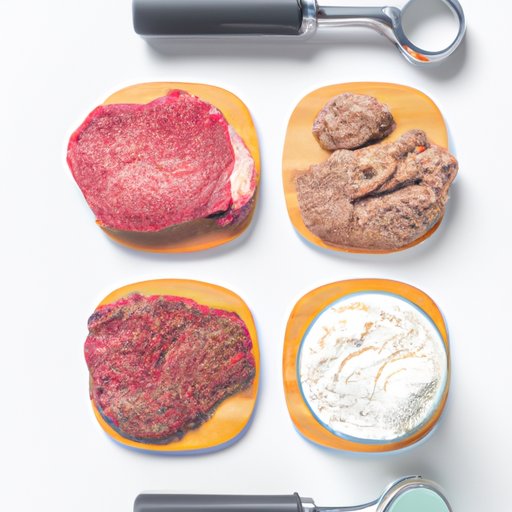
I. Introduction
Protein is an essential macronutrient that plays a crucial role in many bodily functions, from building and repairing muscles to regulating metabolism. However, determining the right amount of protein to consume can be a challenge, as too little or too much can negatively impact our health and wellness. In this article, we will explore the optimal amount of protein we should be eating in a day, based on scientific research and practical guidelines.
II. Benefits of a Protein-Rich Diet: How Much is Too Much?
A protein-rich diet has numerous benefits for our health, including weight management, muscle growth and repair, and reduced risk of chronic diseases. However, the notion that more protein is always better is a common myth that can lead to overconsumption and potential health hazards. Some of the potential risks of overconsuming protein include dehydration, kidney damage, and increased risk of chronic diseases such as heart disease and cancer.
III. The Recommended Daily Intake of Protein: How Much Do You Really Need?
The recommended daily intake of protein varies depending on factors such as age, gender, weight, and activity level. For adults, the Recommended Dietary Allowance (RDA) is 0.8 grams per kilogram of bodyweight, while the Acceptable Macronutrient Distribution Range (AMDR) is 10-35% of daily caloric intake. To ensure adequate protein intake, it is essential to consume protein-rich foods such as meat, fish, eggs, and dairy products, as well as plant-based sources such as beans, nuts, and seeds.
IV. Protein Requirements for Different Lifestyles: Athletes, Vegans and More
The protein needs of different groups, such as athletes, vegans, and older adults, vary due to lifestyle factors. Athletes and people doing intense exercise require higher protein intake to support muscle building, repair, and recovery. Vegans and vegetarians face challenges in achieving adequate protein intake, but plant-based protein sources such as tofu, tempeh, and quinoa can provide a good alternative. Older adults may also benefit from slightly higher protein intake to preserve muscle mass and function.
V. The Potential Risks of Overconsuming Protein: A Comprehensive Guide
The potential risks of overconsuming protein range from acute dehydration to chronic diseases such as kidney damage, osteoporosis, and cancer. Although high protein intake has been associated with muscle growth and fat loss, the evidence suggests that it is not a sustainable or safe long-term solution. Scientific studies and expert opinions have shown that moderation is key when it comes to protein consumption, and that a balanced diet is the most effective way to achieve optimal health and wellness.
VI. How to Calculate Your Protein Needs Depending on Age, Gender and Activity Level
Calculating your daily protein needs is a personal and individualized process, based on factors such as age, gender, weight, and activity level. Online calculators such as the USDA’s SuperTracker can provide a good estimate of how much protein you should be consuming each day, but consulting a registered dietitian or healthcare provider is always recommended for a more accurate assessment.
VII. Foods High in Protein: How to Meet Your Daily Intake Without Overdoing It
There are numerous foods high in protein that can help you meet your daily intake without overdoing it. Animal-based sources such as lean meat, fish, eggs, and dairy products provide complete protein with all essential amino acids, while plant-based sources such as beans, lentils, nuts, seeds, and whole grains offer a variety of nutrients and health benefits. Sample meal plans can be adjusted to meet your individual protein needs and preferences.
VIII. Conclusion
In conclusion, the optimal amount of protein to consume in a day depends on individual factors such as age, gender, weight, and activity level. While a protein-rich diet has many benefits for our health and wellness, overconsuming protein can lead to potential risks and hazards. To develop a safe and effective approach to protein intake, it is recommended to consult a registered dietitian or healthcare provider, who can provide personalized recommendations and support.





